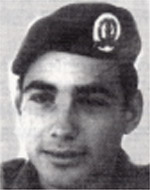Son of Sima and Haim was born in Tel Aviv on June 6, 1946. His father immigrated as an immigrant from Poland on the day the World War II broke out in September 1939 on the illegal immigrant ship Tiger Hill, which ran aground in front of the Tel Aviv beach. His father was one of the founders of Kibbutz Sha’ar Hanegev, and his mother, who was born in Georgia, immigrated to Israel in 1938. He studied at the Son of-Yehuda elementary school in Tel Aviv and at the Shalva Gymnasium until the tenth grade. He was a member of the Hashomer Hatzair movement, and his father, who was cheerful, laughed a lot and acted cynically, but he was easy to be angry, stubborn, and he had an effect on children of his age. Condition Shortly after he was born, his family moved to Givat Brenner for a period of three years, where Moshe developed and was a symbol of health and wisdom, and until the end of high school he played basketball on the youth team of ” Maccabi Tel Aviv. “In July 1964, Moshe enlisted in the IDF and served in the Paratroopers Brigade. He was a sturdy, handsome guy, went through a series of training and courses and succeeded in them. In April 1965, Moshe moved to the rank of corporal. In March 1966 he was promoted to the rank of lieutenant colonel, and Moshe rose to the rank of lieutenant, taking part in the reprisals that preceded the Six-Day War, including the attack on the police station in Samu’a in the Hebron hills and the attack on the Syrian post in Nokayev. And served in the Jordan Valley until September 1966. After that, he served for another year under permanent army service, was discharged from the army in 1967 and began studying at the Technion, Haifa, in the Faculty of Chemical Engineering. In 1972 Moshe completed his studies successfully and began working as a manager in a chemical plant. For a short time he worked in securing El Al planes, then moved to run a drug factory and worked there until he fell. Moshe fought in the Yom Kippur War on the Syrian front as a company commander and was among the Syrian Hermon conquerors for his service in the Yom Kippur War, and his commanders expressed their opinion: “Excellent.” They offered him to return to the career army, In 1975, Moshe served in the reserves as a lieutenant colonel, and rose to the rank of captain. Four years later, he went on to reserve battalion commanders’ course, and rose to the rank of major. Beginning in February 1981, he commanded a battalion in the Paratroopers Brigade. At the beginning of July 1982, Moshe was promoted to the rank of lieutenant colonel, when Moshe Dayan commanded his battalion from the beginning of the war until he fell. He participated in the rescue of casualties, and showed great courage in carrying out all his missions. Be exemplary and exemplary. He showed good control of his regiment. He excelled in coolness, courage, quiet control, but good, with his men. He is able to fill more senior positions. “In another of his commanders’ opinions, he was quoted as saying:” He served as battalion commander during all the fighting, on continuous combat missions, during the first week of fighting until the third week. The high level of casualties in his unit continued to command and operate his unit, and his calm, his leadership ability, was carrying out all his missions. ” On December 21, 1982, Moshe was on a reconnaissance mission near the town of Kamad-a-Luz in the eastern sector, where the jeep he was traveling on a dirt track came upon a mine, and Moshe was killed along with two other officers from his brigade. He was laid to rest at the military cemetery in Kiryat Shaul in Tel Aviv, leaving a wife, two sons, a daughter, two parents and two brothers
